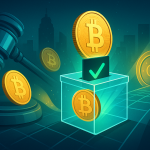In September, Charles Hoskinson, the founder of Cardano, met with President Javier Milei to explore ways Argentina can incorporate blockchain technology across different sectors.
As a result of this meeting, Cardano entered into its first legally recognized smart contract with the Argentine government. This agreement follows the legal framework of Argentina, akin to traditional business contracts, but is executed on the Cardano blockchain.

While this development has yet to influence the price of $ADA significantly, investors are optimistic about potential price increases in the near future.
Let’s delve deeper into the specifics of this agreement and its implications for the Cardano ecosystem.
Setting Legal Precedents in Argentina
The smart contract details a loan arrangement between Lucas Macchia and Mauro Andreoli involving 10,000 $ADA tokens, valued at approximately $3,300. It clearly outlines the repayment timeframe, interest rate, wallet addresses, and transaction identification.
This represents the inaugural instance where an Argentine court can legally uphold a smart contract. But why does this matter?
Primarily, this could lead to the broader use of blockchain within the Argentine legal framework. If successful, it may inspire other nations to adopt similar practices.
Additionally, smart contracts could streamline processes such as loan repayments and insurance claims, eliminating the need for paperwork and intermediaries, thus enhancing accuracy and efficiency.
As a forerunner in the realm of legally enforceable smart contracts, Cardano stands to gain significantly from the rising interest in this technology.
Cardano’s Legal Framework Boosts Solaxy’s Prospects
This agreement with the Argentinian government highlights that blockchain’s applications extend well beyond cryptocurrency projects.
Another emerging project, Solaxy ($SOLX), is capitalizing on this potential.
Its Layer-2 solution aims to alleviate Solana’s congestion issues, facilitating faster transactions and lower costs.
The scalable infrastructure of Solaxy opens up a realm of possibilities, serving as a dependable base for decentralized finance (DeFi) applications, play-to-earn games, AI-driven agents, and even legally enforceable smart contracts, similar to those offered by Cardano.
Moreover, its compatibility with Ethereum enables seamless data and fund transfers within major blockchain networks.
Currently, Solaxy’s native token, $SOLX, is available for presale at $0.001602, with an imminent price increase. Early investors have already purchased over $10.6 million in tokens, indicating promising long-term growth potential.
To participate in the presale, visit Solaxy’s official platform, connect your wallet, and exchange $ETH, $BNB, or $USDT for $SOLX.
Scalability: The Key to Blockchain’s Future
Cardano is ushering in a new era of blockchain acceptance in conventional sectors like government services.
However, for smart contracts to be seamlessly integrated into the fields of banking and law, blockchain networks need to be highly scalable and reliable.
Solaxy could fulfill this essential requirement.
Lastly, remember to conduct thorough research before investing in any initiative, even those with solid fundamentals. The cryptocurrency market is highly unpredictable, so invest only what you can afford to lose.





